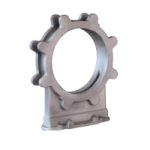Interesting Facts About Alloy Steel Casting
By appropriately combining one or more alloying components with regular carbon steel, alloy steel is created, which is an iron-carbon alloy. The alloy steel can acquire good strength, high hardness, fatigue strength, resistance to corrosion, good permeability, better resistance and non-magnetic, as well as other special features, depending on the various additional components and the suitable processing technology. High alloy steel and low alloy steel are the two primary divisions. Low alloy steel is frequently used in the investment casting of alloy steel.
Common types of alloys in alloy steel
Manganese is the most popular alloying element, followed by nickel, chrome, copper, molybdenum, silicon and boron. Aluminium, cobalt, silver, cerium, niobium, chromium, tungsten, lead, zinc and zirconium are less popular alloys. Although, technically, every type of steel is an alloy, not all kinds of steel can be referred to as ‘alloy steel’. An iron and carbon alloy (ranging from 0.1% to 1%, based on the type) is the simplest sort of steel. However, the word ‘alloy steel’ is a common term designating steel that has additional alloying elements other than carbon added on purpose.
What benefits does alloy steel casting offer?
More creative freedom –
This design allows more flexibility in determining the casting’s size and shape, particularly regarding variety and hollow parts. The alloy steel casting can be produced using the distinctive core casting process. Easy to form and modify, and quickly produce completed goods by designs, allowing for the quick response and shorter delivery times.
Metalworking manufacturing exhibits considerable flexibility and variety –
To suit the requirements of various projects, you can select alloy steel castings with various chemical compositions and organisational structures. Different heat treatment procedures can choose mechanical qualities, extensively use these properties, and enhance solderability and use.
Increase the overall strength of the structure –
Alloy steel casting can improve its competitive edge in terms of cost and economy thanks to the project’s high reliability, weight-reduction design, and quick delivery.
A variety of weight variations –
Smaller alloy steel castings often weigh no more than 10 grams, whereas big castings might weigh several, dozens, or even thousands of tons.
As a result, alloy steel castings should generally take precedence whenever we require parts with high strength properties or dynamic load capacity, crucial pressure vessel castings, or core components that can support large loads at either low or high temperatures.
Huston India Pvt Ltd is a well-known alloy steel casting manufacturer in West Bengal. We are renowned for our casting. Here, you will get flawless and fluid casting. Contact us to learn more about our services.




